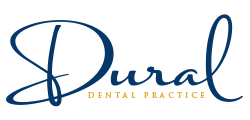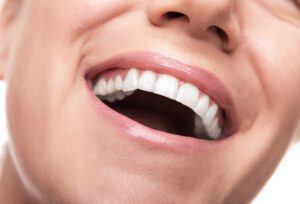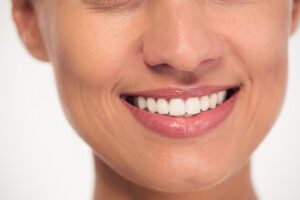During tooth development, hypomineralisation occurs during the maturation stage of tooth formation and affects the final quality of the enamel. Enamel is the hard and dense white layer which covers and protects the surface of our teeth.
Hypomineralisation more commonly affects only a few teeth, usually the molars and lateral incisors. The cells responsible for creating the enamel structure are very sensitive, and disturbances to these cells during development can affect the quality and appearance of enamel. Possible factors that contribute to this condition during development are high fever, low calcium, exposure to antibiotics, traumatic birth or a lack of oxygen.
The enamel can be impacted by these kinds of events particularly during the critical period of the tooth development around birth and the first year of life for babies.
Hypomineralised Molars

You may have heard of a condition which affects the teeth called hypomineralisation. Teeth affected may vary in appearance and severity from mild patchy or milky-white areas, to yellow or yellow-brown with breaks in the tooth surface. These teeth are more vulnerable to tooth decay and prone to breaking down over time if not carefully monitored and treated. More commonly, hypomineralisation occurs in the molar teeth and the lateral incisors. It can affect baby teeth as well as adult teeth.
How Can Hypomineralised Teeth Be Protected?
Hypomineralised teeth can be protected in the dental clinic with the application of sealants and fillings to cover the chewing surfaces of teeth and any patchy areas that are susceptible to breaking down. Regular appointments are necessary to monitor these teeth and your oral hygiene. At home you can protect the teeth by having a healthy diet which is low in sugar and refined or processed foods, limiting snacking, drinking water, and looking after your teeth with good brushing and interdental cleaning. Another way to repair the teeth is to apply Tooth Mousse once a day onto the tooth surface.
What Is Tooth Mousse And Is It Safe?
To help repair some of the affected and patchy areas a product called Tooth Mousse can be applied to the affected teeth once a day. Tooth Mousse contains the ingredient CPP-ACP (calcium phosphopeptide – amorphous calcium phosphate) which incorporates calcium and phosphate back into the tooth structure helping to strengthen and repair the area. It is a topical cream that needs to be applied regularly on the surface of the affected teeth. Tooth Mousse is a safe product to use, however it does contain ingredients derived from milk so is not recommended for anyone with a milk-protein allergy.
What Are The Long Term Consequences?
A healthy diet, good oral hygiene, and routine dental check ups will help to keep your teeth healthy and monitored regularly. Treatment and long term risks with these teeth will depend on the degree of hypomineralisation and how affected the teeth are. In some cases, badly affected teeth may be extracted early on or covered with crowns to protect the remaining enamel and tooth structure. Your dental profession will speak to you about the teeth and what your treatment options are.





